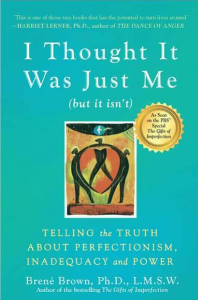I received this email last semester:
Your instructors this year tell me that you are performing very strongly in your courses and might be a candidate for graduate school. I realize that you may not have considered graduate school as an option, but it may be well worth considering and we do offer financial support to students at the masters level–normally, a funding package of minimum 13 000 CAD to help offset tuition and living expenses.
Thinking this might be a form letter that all upper year’s receive from their department, I replied and asked just that. But the professor that emailed me told me she only emailed a “select few” and that I should really try to attend a meeting that would be happening the following week. Needless to say, I was totally flattered, and kind of shocked that this particular professor (a) noticed my work/knew I existed and (b) personally selected me as a grad school candidate. The following week I forced myself to attend the meeting, which turned out to be a standing-room-only name-tag-necessary mingle of undergrads, grad students, and professors in a tiny room organized around tables of deep-fried finger platters. After being cornered (literally stuck in a corner of the room) by a history grad student (who I am certain was there to pick up) and his supervisor for a terribly uncomfortable 5 minutes, I talked to the Graduate Chair; she informed me that when a professor asks you to consider grad school it means they want to work with/supervise you. She also added that when this particular professor (with whom I’ve taken many classes and have been simultaneously intimidated and inspired by) suggests you apply to grad school, you apply. No questions asked.
Being so easily swept up by such flattery and the almost romantic notion of being paid to study (!!!), I started desperately trying to unearth the thing that I find so compelling that I could happily and proudly research for the next two years. There were a couple of immediate ideas – one that I had previously considered for graduate work in urban planning or sociology that would translate very well into gender studies work, and one or two others that I don’t actually know if I would be able to research thoroughly enough to present a comprehensive thesis (I’ve never taken stats…shh.)
At this point I started looking into the application process, which quickly reminded me that the trick to getting into any university program (at least at Queen’s) is knowing how to apply in the first place. I was easily overwhelmed by how much I didn’t know about the ins and outs of graduate school which in turn made me feel inadequate and incapable. I contacted the professor that emailed me to (sheepishly) ask for some guidance and I interpreted her response as, “ya, I’m kind of here to help, but I’m a busy professor and its up to you to figure it out.” And while this may in fact be a perfectly reasonable response, I felt even smaller after reading it. Not feeling like I had anyone else to turn to who could help me understand the process, I gave up on the idea and declined the invitation to apply.
The result of this decision has left me feeling somewhat undone and utterly confused about my future, as has been the case for a few years now. Before the opportunity of graduate studies was on the table (I had never truly put it on the table for myself because I didn’t think I was good enough), I was working towards the end of my bachelor degree as if I were standing at the shore-end of a dock, slowly moving closer to its end where I would eventually be left standing, looking out into a thick fog with no idea as to what might be more then 5 feet ahead of me. While receiving the email and considering my potential acceptance to grad school didn’t clear the fog, it extended the dock, giving me more time before I would have to face it. More time and maybe finally some direction.
Until recently I had no insight into my reaction to this whole situation. My feelings of inadequacy and unworthiness for my lack of information, at the time, felt natural and accurate, since they were my natural reaction. Then, by luck or design, I was introduced to the work of writer/researcher/social worker Brené Br own when I read her book, I Thought It Was Just Me (But It Isn’t): Telling the Truth About Perfectionism, Inadequacy, and Power. It was recommended to me by a counsellor, and since I love the feeling of success I get from completing assignments for counsellors, I read it in the two weeks before my next appointment. Since then I’ve also listened to her audio release called Men, Women, and Worthiness, and I’m currently reading The Gifts of Imperfection. She also has work on parenting and vulnerability, but since I’m not a parent and I’ve got vulnerability on lock, I’ve focused on the three items above. In a nutshell, Brown’s research focuses on shame and shame resilience – the notion that shame is a destructive feeling (as opposed to guilt, which is constructive) and methods that she found throughout her research that people use or embody in order to be/come resilient to it. I highly recommend any or all of these works to anyone who ever finds themselves feeling like they’re not enough or good enough in their experiences with friends, family, work, and daily life in general (which is a lot of us).
own when I read her book, I Thought It Was Just Me (But It Isn’t): Telling the Truth About Perfectionism, Inadequacy, and Power. It was recommended to me by a counsellor, and since I love the feeling of success I get from completing assignments for counsellors, I read it in the two weeks before my next appointment. Since then I’ve also listened to her audio release called Men, Women, and Worthiness, and I’m currently reading The Gifts of Imperfection. She also has work on parenting and vulnerability, but since I’m not a parent and I’ve got vulnerability on lock, I’ve focused on the three items above. In a nutshell, Brown’s research focuses on shame and shame resilience – the notion that shame is a destructive feeling (as opposed to guilt, which is constructive) and methods that she found throughout her research that people use or embody in order to be/come resilient to it. I highly recommend any or all of these works to anyone who ever finds themselves feeling like they’re not enough or good enough in their experiences with friends, family, work, and daily life in general (which is a lot of us).
Without going into the details of Brown’s work (because you’ll get them when you read her stuff), I will say that I find it deeply relatable and invaluably eye-opening. The shame I felt when I did’t know how to apply to grad school and all of the grants and bursaries, which at the time I identified simply as the realities of my innate shortcomings as a human being, inherent to who I am, is the same shame that, according to Brown, everyone feels in whatever situations bring about one or both of two internal shame dialogues: you’re not good enough and who do you think you are? Brown says that in most cases of shame she explored in her research, these two internal dialogues are so common to shame that they are nearly universal.
In my grad school situation I felt so inadequate that I engaged both dialogues; first I realized I’m not good enough to apply since I can’t seem to figure out a process that millions of people figure out every day; this kickstarted my shame for me and led me to the question just who do I think I am, thinking that I could be successful in graduate school when I can’t even manage to apply? As if I would even be accepted if I could!
I wonder if I had this knowledge back then if I would have been able to recognize my shame and challenge it, allowing myself to continue to stumble through the application process, even though at the time it was so much easier to give up; to just listen to my internal shame dialogue and run.
Now here I stand at that same place on the dock with a world of fog in front of me and no extending planks to add on. In July I will officially complete my (never ending) honours degree and be forced to figure out what to do next. Coincidentally, the options I’ve been drawn toward lately require a master’s degree…what to do, what to do?


You are an inspiration Bean!
Next time you are in a similar situation reach out for help. (Do as I say, not what I do) Plenty of cats out here would love to lend a hand.
Anything school related: just call Sheryl!!!
LikeLike
Thanks Shan, I know you’re right!
LikeLike
Great read, Justine. I feel your frustration.
LikeLike
Thanks for reading :)
LikeLike